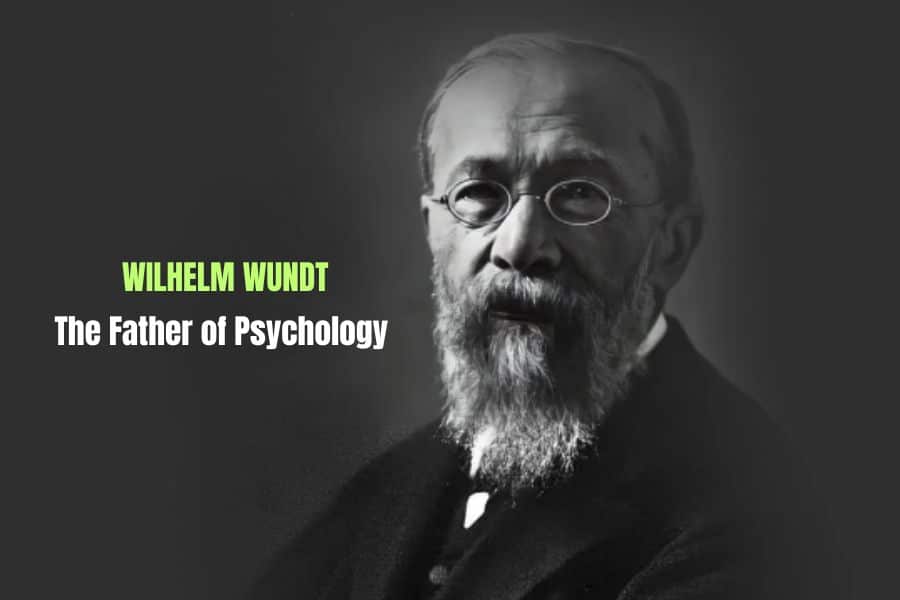Wilhelm Wundt is widely regarded as the progenitor of modern psychology. His groundbreaking psychological research has had a colossal influence on psychology and continues to shape our current understanding and inquiry into human behaviour. In this blog post, we shall investigate Wilhelm Wundt’s pioneering contributions to the science of psychology while concurrently examining his captivating biography.
We will explore in detail how he revolutionized psychological exploration and discover what inspired him on that path throughout life; furthermore, some key theories that have been tremendously influential for generations will also be discussed hereunder.Thus, let us journey through time to uncover the story behind one of the most significant personalities within contemporary academia: Wilhelm Wundt!
Table of Contents
Wilhelm Wundt’s Fascinating Biography: The Father of Psychology

Professorship and Establishment of Psychological Laboratories
One example of Wilhelm Wundt’s work is Principles of Physiological Psychology, which explains fundamental concepts associated with human behaviour, such as how emotions are generated through sensory data, how sensory information is processed within the brain, and how memories form over an extended period.
Moreover, his renowned book “Outlines of Psychology” offers a comprehensive analysis of different areas related to psychology, including consciousness comprehension, recollection formation, learning processes, and more.
His invaluable contributions have been incredibly influential in modern psychology for centuries now, yet were only sometimes appreciated and comprehended correctly due to misinterpretations from earlier psychologists who contested certain speculations or failed to understand them altogether. Nevertheless, contemporary psychologists acknowledge him as one of the greatest intellects ever whose remarkable insights into our mindsets and habits have significantly shaped today’s field since its emergence about 150 years ago.
The Birth and Background of Wilhelm Wundt (1832)
Wilhelm Wundt occupies a prominent place in the annals of psychology. He is widely recognized as the father of experimental psychology. Born in Germany in 1832, he was educated at Heidelberg University for philosophy studies, and his research was heavily invested in understanding how individuals perceive and process information and form thoughts and emotions and at this time, psychology had yet to take its first steps as an accepted discipline. Thus, he can be regarded as one of the early pioneers who worked toward achieving that goal.
Initially undertaking professorship duties at the University of Heidelberg, Wundt conducted experiments and wrote extensively about his discoveries, further developing scientific knowledge of psychological processes. His discoveries revolutionized our comprehension of mental activities while paving a path towards contemporary psychological science.
Pursuit of Knowledge: From Medicine to Philosophy
The groundbreaking work of Wundt concentrated on comprehending how mental processes might be examined through observation and experimentation. He proposed that psychological phenomena could be broken down into minuscule elements and then studied systematically utilizing scientific methods like hypothesis testing and data analysis.
Furthermore, his theories provided a fundamental basis for later psychologists to build upon to devise more sophisticated models for understanding perception and behaviour. Additionally, Wundt impacted other domains, including philosophy, anthropology, sociology, linguistics, physiology, and medicine.
Early Education and Transition to Psychology
Wilhelm Wundt’s research offered a solution to the problem of bridging gaps between areas by introducing scrupulous methodologies into their study for the first time, bringing them all under one umbrella term: “psychology” or “the science of mental life”, as he correctly referred to it.
Besides his academic work, Wundt was also prominently renowned in public circles and wrote extensively concerning ethics and morality throughout his lifetime; this was particularly true during World War I when many people were confronted with personal ethical predicaments due to their participation in battle or making sense out of what they encountered each day across Europe at that point in history.
Establishing Psychology as a Science
Founding the First Psychology Laboratory (1879)
Wundt is widely recognized as the father of experimental psychology. He was educated at Heidelberg University. As a professor at multiple educational institutions such as Leipzig University and Zurich University before finally settling down in Leipzig, Wundt established the world’s first laboratory for psychological research.
Most notable, though, is perhaps his establishment in 1879 of what has come to be known today as modern academic psychology’s founding laboratory, wherein researchers could study psychological phenomena using empirical methods, thus heralding a new era for education and research into the said topic area
Introspection: Unraveling the Human Thought Process

Wundt is most celebrated for his investigation involving what he termed “introspection”, which entailed employing self-observation to examine conscious experience. He engaged in introspection to identify the separate elements that comprise conscious experience, including sensations, feelings, and images.
It enabled him to generate theories about the human thought process and our capability to make judgments based on experiences. The impact of his work remains evident today in contemporary experiments which use highly similar methods – such as eye-tracking technology – for measuring people’s responses when confronted with certain stimuli.
Breaking Down Conscious Experience: Structuralism Unveiled
Throughout his career, Wundt formulated some significant theories regarding personality structure and its correlation with behaviourism, suggesting that behaviour is determined by environmental factors rather than internal processes like emotion or motivation. It was highly influential in paving the way for later theorists, such as Sigmund Freud, to build upon these ideas when constructing their concepts concerning human conduct and character organization.
Moreover, besides his theoretical works, Wundt also conducted many empirical studies which educated us on sundry psychological phenomena such as memory formation or attention span duration, thereby giving essential insights into how our minds operate and allowing modern psychologists to elucidate these intricate mechanisms further.
Wundt’s Theories and Contributions
Functionalism: Examining Behavior and Its Function
Wilhelm Wundt’s pioneering contributions to psychology were extensive; he constructed the base for many of the theories that are still applied nowadays, such as structuralism (the exploration into conscious experience), functionalism (the examination of behaviour) and psychophysics (in connection with physical stimuli and psychological reactions).
Moreover, he invented introspection, which depends on self-reflection to analyze the conscious experience. This technique is continually being utilized by researchers at present. As well as introducing fresh ideas, Wundt wrote some influential books describing his work carefully.
Do you want to know how Psychology evolved as a science?. Click Here
Legacy and Recognition

Wilhelm Wundt, the founder of modern psychology, is widely recognized as one of the most prominent figures in the history of psychological study. The legacy left by Wundt will remain within experimental psychology, which he initially developed during laboratory conditions.
It marked a pioneering moment for psychology; before this development, psychological studies were primarily conducted through observation or introspection. By utilizing scientific methods such as conducting experiments and collecting/analyzing the data gained, Wundt helped establish psychology as an empirical science instead of only remaining an armchair pursuit. This fresh approach introduced novel ways to explore mental conditions like memory, perception, and emotion that were previously untouchable due to their subjective quality.
Apart from his remarkable input into experimental psychology, Wundt is celebrated for his significant theory regarding mental structures, known as structuralism. This concept highlighted that all experience can be divided down into elementary components or “structures” which should be examined in their context rather than attempting a holistic analysis at long range – similar manner other philosophical theories did beforehand- forming an essential move towards getting knowledge about the intricate inner workings of human minds that still influences much current day psychological research today.”
Important Dates
Some important dates related to Wilhelm Wundt and his contributions to psychology that you can remember:
| 1832 | Wilhelm Wundt is born in Neckarau, Germany. |
| 1851 | Wundt begins his studies in medicine and later switches to philosophy. |
| 1856 | He receives his doctorate in medicine. |
| 1862 | Wundt becomes a lecturer at the University of Heidelberg. |
| 1874 | He is appointed as a professor of philosophy at the University of Zurich. |
| 1875 | Wundt publishes his book “Grundzüge der physiologischen Psychologie” (Principles of Physiological Psychology). |
| 1879 | Wundt establishes the world’s first psychology laboratory at the University of Leipzig. |
| 1897 | His influential book “Völkerpsychologie” (Ethnic Psychology) is published. |
| 1917 | Wilhelm Wundt passed away in Germany, leaving behind a profound legacy in psychology. |
Summary of Wilhelm Wundt’s contribution: The Father of Psychology
Wundt is widely respected as the Father of Psychology. He was a German physiologist, philosopher and professor who made history by inaugurating the first psychology lab.This important event marked the commencement of contemporary psychology and revealed Wundt’s advanced method of science. His studies concentrated on comprehending how human minds operate, and he provided considerable information that has helped build our knowledge about cognition and thought processes.
Furthermore, Wundt also formed a new school of philosophy called structuralism which attempted to investigate consciousness by splitting it into its components or structures.
Wundt had a vision that if an individual could comprehend the workings of various elements, they would be enabled to acquire insights into how these components unitedly generate conscious experience. His investigations revealed some fundamental regulations concerning mental activities, which are still part of contemporary knowledge.
His work significantly impacted numerous areas of psychology, such as cognitive psychology, developmental psychology and psychotherapy; it is even believed to have influenced notables like Sigmund Freud and John B Watson, who both employed his notions in their research projects.
Presently, his theories continue being studied on university curricula all over the globe giving evidence for their enduring heritage within this field of study. Consequently, although Wundt may not be known by many household names from history just yet, his initial contributions have made an indelible imprint on our comprehension of human behaviour that shall persist through future generations ahead!
Conclusion
In conclusion, Wilhelm Wundt’s pioneering contributions to psychology have impacted the field. His work was revolutionary in its methods of conducting psychological research, and his genuinely fascinating biography continues to inspire students studying psychology today. From his innovative utilization of introspection to his epoch-making theories concerning consciousness, there can be no doubt that Wundt’s influence has been unparalleled within the annals of psychological study.
FAQS
Who is Wilhelm Wundt and why is he significant in psychology?
Wilhelm Wundt is often referred to as the father of experimental psychology. In 1879, he founded the first psychology laboratory at the University of Leipzig, which is considered the formal beginning of the science of psychology.
What were Wilhelm Wundt’s main contributions to psychology?
Wilhelm Wundt’s main contributions include the application of the introspection method in psychology and the concept of establishing psychology as a separate branch of science from philosophy and biology. He also contributed to the formation of structuralism.
How did Wilhelm Wundt’s approach differ from other early psychologists?
The first approach was by Wilhelm Wundt, who used structuralism, which involved the analysis of the basic structures of the mind with the use of introspection. This was different from the later trends, such as functionalism, that sought to explain the goals of mental processes.
What is the significance of Wilhelm Wundt’s laboratory at the University of Leipzig?
The University of Leipzig is essential because it housed the first psychological laboratory, established by Wilhelm Wundt. This lab played a significant role in legitimizing psychology as an empirical discipline and training many future psychologists.
How has Wilhelm Wundt’s work influenced modern psychology?
Wilhelm Wundt’s work laid the groundwork for various branches of psychology, including cognitive psychology and experimental psychology. His emphasis on systematic experimentation and observation continues to influence contemporary psychological research methods.













